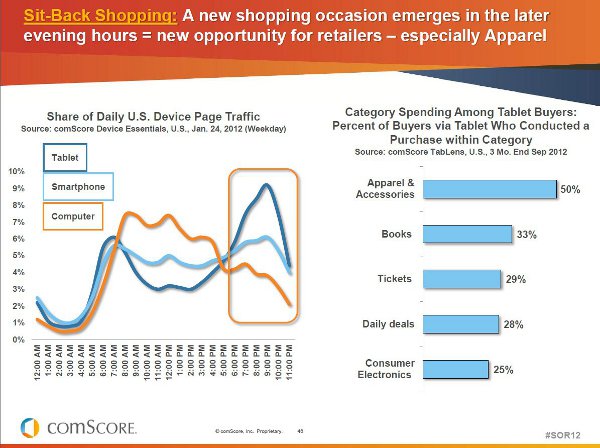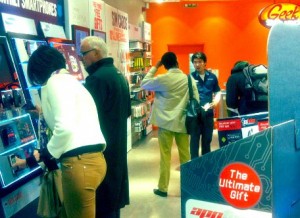By Andy Soloman
We all know that while the High Street is struggling, ecommerce is booming. The latest figures from the British Retail Consortium nationwide survey shows that more than one in 10 shops were empty during October.
In the regions, it's even worse. Around 20% of stores stand idle in Northern Ireland, while across Wales the figure is 15%. In London it's slightly lower with 7.6% of shops empty.
Yes, the economy appears to be in terminal freefall as costs for retailers rise and consumers are pinched. Yes, footfall is dropping, spending is down, and, worst of all for the bricks and mortar brigade, more and more people are choosing to spend online. The ecommerce world is rapidly growing.
But as well-known names either scale back or disappear entirely (think Comet, JJB Sports, Game and Peacocks) from shopping areas, those with a multi-channel strategy should be riding a wave.
The evening ecommerce rush hour
Looking through the latest presentation by comScore, the digital analytics business, on the state of the US online retail economy in the third quarter of 2012, there is a clear message that as technology drives changes in consumer behaviour, retail businesses need to quickly stand up and take note.
 Are your lights on when the evening ecommerce shopping rush arrives?
Are your lights on when the evening ecommerce shopping rush arrives?
It is a clear example of technology creating convenience for the consumer. The rise of the iPad and other tablet devices has created the ability to lounge comfortably at home surfing the net, engaging with social media while still watching television. It is a natural extension for people to complete their shopping. And as the chart above shows, it is clothing, books, tickets and electronics that lead the way.
While the comScore research was based on ecommerce sales originating in the US, similar patterns will inevitably be emerging elsewhere, especially in Europe, Australia and parts of Asia.
Make sure you serve your customers
So, if the shoppers are queuing up online during the new peak hours of 8pm to 10pm, or even later, what should online retailers be doing to ensure they maximise the opportunities this presents?
For smaller retail businesses -- and this applies to both multi-channel retailers and online etailers -- it is critical to think beyond standard business hours, and consider how customer services can be more effectively targeted at the late-night or evening shoppers. Afterall, no-one wants to lose a sale and see customers abandon their online shopping because they can't get the help they need or a simple question answered.
Beyond keeping a team pulling a late shift every day, the options are actually quite limited. But if the problem can be solved, it is a powerful tool. When a customer has a question that demands an immediate response such as clarification on delivery or returns policy, a phone line leading to an answer machine or an email address that promises a response within 48 hours is of absolutely no use.
Online shoppers need immediate answers
If the customer fails to get an immediate answer there is a real risk they will abandon their shopping and go elsewhere. Ecommerce allows online shopping to take place 24 hours a day, but just because the door is open, from a customer perspective it sometimes feels as if the lights are turned off. Those businesses looking to avoid this problem have to invest in 24 hour customer support. Live chat can provide the platform, and it is a sound investment to link up with a provider of live chat operators who can engage directly with customers.
Out-of-hours mobile- or tablet-fuelled shopping is only going to grow. Online retailers need to carefully consider how they can effectively serve those customers. It is in everyone's interest. The revenue will grow and the customers will be happy.
About the author: Andy Soloman is Yomdel's CEO. Yomdel delivers operator-backed live chat services for ecommerce. Andy is passionate about delivering the best possible experience bringing together online businesses and their customers.






